| Srl | Item |
| 1 |
ID:
123385
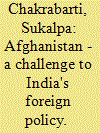

|
|
|
|
|
| Publication |
2013.
|
| Summary/Abstract |
Afghanistan has turned into one of India's most complex foreign policy challenges -with conflicting regional and extra regional players upping their stakes in the country. With barely a year left for the international community's retreat from Afghanistan, there is serious concern over the shaping up of economic, social, cultural and political trajectories therein. Finding common ground with the Taliban has become increasingly elusive and neither the Afghan army nor the political clan is showing any convincing signs of the capacity to assume responsibility for security and integrity of the country.
|
|
|
|
|
|
|
|
|
|
|
|
|
|
|
|
| 2 |
ID:
109713
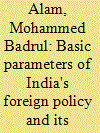

|
|
|
| 3 |
ID:
129938
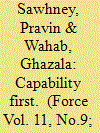

|
|
|
| 4 |
ID:
132932
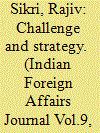

|
|
|
|
|
| Publication |
2014.
|
| Summary/Abstract |
For some time now, there has been a buzz about India's growing role in the world and a widespread feeling that India must play a much larger global role. Today, this feeling has become far more acute.
It is important, then, that there should be greater, and more widespread, awareness of foreign policy challenges faced by India, as well as a deeper understanding of the stakes and options for India's foreign policy. The public needs to be more knowledgeable about foreign affairs, which cannot be the concern only of those who exercise power in New Delhi. It is something in which every citizen should be involved. It is also essential that there should be a vibrant and constructive debate, especially involving the young, on where we are headed and why, because unless there is public support our foreign policy will not be successful. Some recent incidents pertaining to our relations with Sri Lanka and Bangladesh where the Chief Ministers of Tamil Nadu and West Bengal respectively forced the hand of the Central Government illustrate this point. I am glad that the BJP manifesto talks about having a "Team India" that brings together the Prime Minister and the Chief Ministers of States.
My conversation with you today is a small effort to create this awareness, perhaps stimulate your imagination and set you thinking.
|
|
|
|
|
|
|
|
|
|
|
|
|
|
|
|
| 5 |
ID:
100414
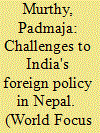

|
|
|
| 6 |
ID:
142128
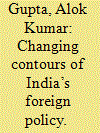

|
|
|
|
|
| Summary/Abstract |
Undoubtedly, Modi’s international engagements were a continuation of India’s foreign policy under the preceding UPA government led by Congress. But he injected a new energy into the relationships with neighbours like Bhutan and Nepal, and major powers like China and the US. The present political leadership has made clear to the immediate neighbourhood that India is ready to share its prosperity because the policy makers understand peace could be established only through prosperity and would enhance constructive engagement and a more integrated and inter-connected sub-continent. Modi rather than making India a marginal receiver of the dispensation of the international system has lifted India’s status as one of the dispensation of the international system.
|
|
|
|
|
|
|
|
|
|
|
|
|
|
|
|
| 7 |
ID:
182156
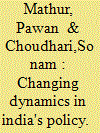

|
|
|
|
|
| Summary/Abstract |
Relations between India and Afghanistan are characterised by strong historical and cultural links. The two nations share common ideals in the domain of foreign policy such as adherence to multilateralism, respect for a rule-based international order and eliminating the North-South divide. Pawan Mathur and Sonam Choudhari examine how the Indian policy towards Afghanistan even after the takeover of Taliban stresses on norm development and transcendental power as India strives for a peaceful and stable Afghanistan marked by a strong democracy and rule of law. India’s security concerns in Afghanistan after the seizure of the Taliban are also emphasised.
|
|
|
|
|
|
|
|
|
|
|
|
|
|
|
|
| 8 |
ID:
119376
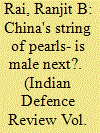

|
|
|
| 9 |
ID:
142132


|
|
|
|
|
| Summary/Abstract |
The contributions of Modi in the field of foreign policy have been his visits to Bhutan and Nepal after becoming the prime minister which was unheard of earlier. That has boosted the Himalayan spheres which were ignored for almost seven decades. His invitation to the heads of these countries for his oath taking ceremony was to continue the trajectory of good friendly relations with neighbours while also removing any apprehensions of these nations against India. He seems to be determined to streamline the sea route of India which became the easy route of terrorist outfits. Moreover he has been trying to connect India with the disconnected part of the world. These factors will pay great dividends in the future if India is sincerely committed to shape a strong strategic culture through its cohesive foreign policy.
|
|
|
|
|
|
|
|
|
|
|
|
|
|
|
|
| 10 |
ID:
138361
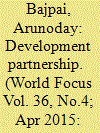

|
|
|
|
|
| Summary/Abstract |
India needs to address various challenges to make her development partnership more effective. If India's development partnership has to work as 'soft power' instrument of India's economic diplomacy, it has to be motivated by the spirit of sharing, equal partnership, mutual benefit, and India's entitled national interest.
|
|
|
|
|
|
|
|
|
|
|
|
|
|
|
|
| 11 |
ID:
104506
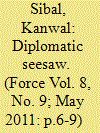

|
|
|
| 12 |
ID:
131146
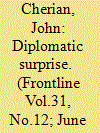

|
|
|
|
|
| Publication |
2014.
|
| Summary/Abstract |
The invitation to the Pakistan prime minister to attend the swearing-in of Narendra Modi may have been a diplomatic coup but Nawaz Sharif agreed to come as he was looking for something more substantial than a photo-op.
|
|
|
|
|
|
|
|
|
|
|
|
|
|
|
|
| 13 |
ID:
142131
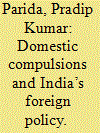

|
|
|
|
|
| Summary/Abstract |
We have to bring some sort of rough consensus among all the groups, political parties, ideological groups, ethnic groups regarding number of domestic issues. Rather our differences of opinion should not be known to outside. It must be solved within. Then only we can think of a strong foreign policy having rooted in domestic issues, with more or less consensuses among all the stakeholders. Today, as India itself has moved to the center of global politics with an increase in its economic and military capabilities, it is being asked to become a stakeholder. India is a rising power in an international system that is in flux, and it will have to make certain choices that probably will define the contours of Indian foreign policy for years to come. The stakes are too high for India as well as the international community.
|
|
|
|
|
|
|
|
|
|
|
|
|
|
|
|
| 14 |
ID:
125319
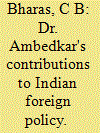

|
|
|
|
|
| Publication |
2013.
|
| Summary/Abstract |
But his earnest efforts on foreign policy making and shaping of foreign affairs of India have been over looked. Today, with the help of development of information technology, scientific and technological and machines and tools, we can understand and come to know many things about this great man.
|
|
|
|
|
|
|
|
|
|
|
|
|
|
|
|
| 15 |
ID:
129873
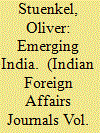

|
|
|
| 16 |
ID:
087511


|
|
|
|
|
| Publication |
2009.
|
| Summary/Abstract |
This paper will provide a survey of India's foreign policy from 1947
to the present day. It is divided into three distinct historical sections.
It will also attempt to explain the underlying reasons for these policies,
India's initial orientation, and subsequent shifts that occurred over
time. The first section deals with the period from 1947 to 1962, the
second from 1962 to 1991 and the third from 1991 to the present. The
choice of these three segments is far from arbitrary. The first period
constituted the most idealistic phase of India's foreign policy under
the tutelage of India's first Prime Minister, Jawaharlal Nehru. The
second began with India's disastrous defeat in the 1962 Sino-Indian
border war. This period saw a gradual shift away from the early idealism
that had characterized the country's foreign policy and the adoption
of an increasingly "self-help" approach to foreign policy while retaining
elements of the Nehruvian rhetoric.1 The third phase began with the
end of the Cold War and the adoption of a more pragmatic foreign
policy hewing closely to the principles of Realism.
|
|
|
|
|
|
|
|
|
|
|
|
|
|
|
|
| 17 |
ID:
127467
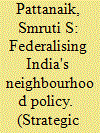

|
|
|
|
|
| Publication |
2014.
|
| Summary/Abstract |
The politics of coalition has posed new challenges to India's foreign policy. This problem becomes particularly evident in India's neighbourhood, which inevitably becomes intertwined with domestic politics. The rise of regional political parties and their role as coalition partners makes it more difficult for the union government to ignore provincial sentiments. Competitive politics featuring both national and regional political parties provides primacy to local interest as this is linked to the vote bank politics. Given the fact that coalition politics has become a reality, this article analyses how to engage the states and make them stakeholders in furthering India's neighbourhood policy.
|
|
|
|
|
|
|
|
|
|
|
|
|
|
|
|
| 18 |
ID:
170894
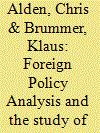

|
|
|
|
|
| Summary/Abstract |
This article proposes that the study of Indian foreign policy and Foreign Policy Analysis (FPA) offers a “win-win situation” for scholarship. On the one hand, this bridge-building exercise leads to a better understanding of the making and substance of Indian foreign policy. On the other hand, it advances FPA in both theoretical and empirical terms, thus contributing to overcoming FPA’s US/Western bias and to decentering the field more generally. Framing the argument in terms of levels of analysis, we offer specific contributions to the understanding of foreign policy in areas such as leadership traits, poliheuristic theory, coalition politics, and state-society influences. Moreover, this line of research suggests the contours of a new comparative foreign policy agenda which could emerge from this examination of Indian foreign policy.
|
|
|
|
|
|
|
|
|
|
|
|
|
|
|
|
| 19 |
ID:
142123
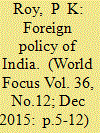

|
|
|
|
|
| Summary/Abstract |
The foreign policy of a country is conceived, designed, and formulated to safeguard and promote its national interests, in her external milieu, in the conduct of relations with other countries, bilaterally and multilaterally. It is a direct reflection of a country’s traditional values and overall national policies, her aspirations and self-perception. In the Indian context, the aim and objective of the Foreign Policy of India is that of an independent, developing and democratic country, to safeguard and promote its national interests and be the enabler of Indian developmental processes through positive and proactive external engagement. It is to be a facilitator of economic development and an instrument to ensure security from external threats so as to bring prosperity to the people of India. It seeks to leverage international relationships in enhancing trade and investment, in assisting infrastructure development, technology transfers to boost manufacturing sector and establish peace and tranquillity in the region.
|
|
|
|
|
|
|
|
|
|
|
|
|
|
|
|
| 20 |
ID:
142125
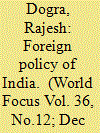

|
|
|
|
|
| Summary/Abstract |
A grand external strategy would require that interactions between different strategic objectives be examined to arrive at the right balance. There is clearly a possibility of a trade off between some interactive objectives, and even between components of an objective. Despite the heightened expectation of the global community, the implications of India’s enhanced role in global issues and governance needs to be looked at within the parameters of its growth and security objectives. In case of contradictions, the former should be given lower priority in the conduct of the country’s foreign policy. This does not, in any sense, imply an abdication of global responsibilities, but rather that India cannot afford to let them pose a trade-off on the more important aspects of its national security. Today standing on the crossroads of global highways of the international politics and relations, it is India’s moment of millennial opportunity. The challenge is to convert the national hope into reality. To make a great leap in congruence to our collective Vision of 2020, an intellectual foreign policy is the only panacea for all evils.
|
|
|
|
|
|
|
|
|
|
|
|
|
|
|
|